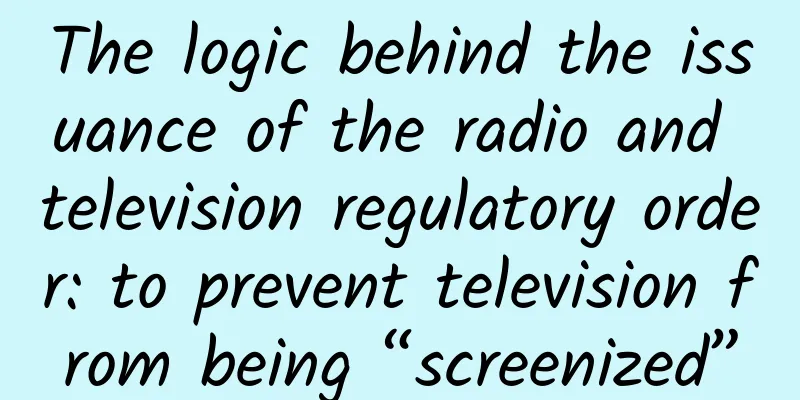The logic behind the issuance of the radio and television regulatory order: to prevent television from being “screenized”

|
As early as 2011, the State Administration of Radio, Film and Television issued the "Operation and Management Requirements for Institutions Holding Internet TV Licenses" (hereinafter referred to as Document No. 181), which clearly stipulates that TV screens can only be connected to external telecommunications networks and the Internet through seven "Internet TV integration platforms." In the past 40 days, the State Administration of Radio, Film and Television has issued four regulatory orders to further strengthen the spirit of Document No. 181. It is also understood that the revised version of Document No. 292 may be released before the end of this year. From this, it can be seen that in the eyes of the State Administration of Radio, Film and Television, television is more than just a screen. In order to explore the logic behind the issuance of the relevant regulatory order by the State Administration of Radio, Film and Television and its impact on the integration of the three networks, the reporter of "Daily Economic News" (hereinafter referred to as NBD) interviewed Hou Ziqiang, former member of the Communications Technology Committee of the Ministry of Industry and Information Technology, and Chen Zhigang, a well-known telecommunications expert. Preventing TV from becoming a screen NBD: The State Administration of Radio, Film and Television has recently issued a series of regulatory orders. What is the logic behind them? Hou Ziqiang: The State Administration of Radio, Film and Television believes that television media has the greatest influence, while the influence of Internet media is relatively weak, so computers can be used as terminals, but the role of television is not just a terminal screen. Strict management of television is the basic idea of the regulatory policy. The reason why the State Administration of Radio, Film and Television issued 7 "Internet TV Integrated Platform" licenses is that it wants to prevent television from being "screenized" by controlling content. According to Document No. 181, mobile phones, tablets and TVs were previously classified as one type of management, all of which required licenses and strict management. Only online TV stations were allowed to be watched, and nothing else was allowed. But in fact, mobile phones and tablets have technically surpassed the above regulations of the State Administration of Radio, Film and Television. On the TV side, although the State Administration of Radio, Film and Television can enforce the relevant provisions of Document No. 181 by prohibiting installation management by TV manufacturers, this is once again challenged in the era of smart homes: users have achieved multi-screen linkage in the living room, and users can project content to the TV through mobile terminals such as mobile phones. This practice indirectly breaks through the relevant provisions of Document No. 181 of the State Administration of Radio, Film and Television. Chen Zhigang: The State Administration of Radio, Film and Television has mainly taken four measures to strengthen supervision: First, Internet radio and television boxes cannot freely install APPs; second, several channels are stipulated; third, the radio and television system has made its own operating system TVOS, requiring all regular manufacturers to access the TVOS centralized broadcasting platform, and not allowing telecommunications and the Internet; fourth, it centrally issues 7 Internet TV licenses, but encourages the issuance of content licenses to provincial institutions. These four measures, from content, operating system, pipeline and broadcasting platform, all point to one problem, that is, Document No. 181 clearly prohibits television from directly accessing the public Internet, which is a policy demand. The country must ensure the security of cultural information, which is also the main reason behind the State Administration of Radio, Film and Television's adoption of these technical and policy measures. Some people interpret the above policy of the State Administration of Radio, Film and Television as the interests of the license holders. In fact, as long as the supervision is strict, the bargaining power of the seven license holders will definitely increase, but I don’t think this is the main purpose of the State Administration of Radio, Film and Television. Its main demand is still to make the TV screen "controllable". Mistakenly treating telecom operators as rivals NBD: As early as 2001, the concept of triple-network integration was clearly defined in government documents, and a timetable for the integration was clearly introduced in 2010. However, it remains unresolved to this day. What kind of interest structure dilemma is behind this? Hou Ziqiang: At present, the integration of the three networks is not progressing smoothly. The State Council has held many meetings, but only one IPTV issue has been resolved. In the documents on the integration of the three networks, "Internet TV" is not mentioned at all. The entire three-network integration only solved one problem, IPTV, and opened up IPTV. However, the contradiction of IPTV is a contradiction within the State Administration of Radio, Film and Television, and is a problem of interest between TV stations and cable TV stations. It has nothing to do with telecommunications. Now the three-network integration excludes cable TV, and the transaction is done between telecommunications and TV stations. TV stations broadcast programs to telecommunications operators, and telecommunications pays. Now the two have a good interest chain relationship. At present, IPTV has become a secondary contradiction. The real biggest impact is online TV. IPTV is controllable, while online TV is more open. Moreover, I think the most important thing is that the premise of the basic thinking of the previous regulatory policy no longer exists. First of all, the previous premise is that TV media has the greatest influence, but now it is obvious whether TV media has a greater influence or mobile phones have a greater influence. At present, most of the viewers of TV programs are elderly people, which is obviously not the key group for the public opinion guidance of the State Administration of Radio, Film and Television. Secondly, the regulatory policy at that time also had a premise of interest considerations, that is, through artificial policy settings, TV stations were given a certain amount of strategic time to grow themselves. However, after a few years, the TV stations have not grown and developed, and have lost the strategic time. The current situation has been determined, so this premise no longer exists. Chen Zhigang: The technical or economic conditions of the Internet and telecommunications sides are relatively good, but the progress of cable TV networks in terms of technical conditions and policy environment has not been very smooth and there are many problems. In the integration of the three networks, the broadcasting and television industry has become the weak link. There are many reasons behind this, but the main reasons may be two: First, the broadcasting and television industry lacks an overall operating entity, which makes it impossible for its internal forces to work together. The broadcasting and television industry originally had the China Radio and Television Network Corporation, but there was no unified national operating entity, such as Wasu, Bestone and other similar large companies, and there was no organization to manage the national cable network in a unified manner. It was not until this year that the State Grid Corporation was established. Secondly, it may be related to the positioning of the radio and television system. Around 2011, both the media and experts were clamoring for the radio and television system to have a license and a unified market operating entity, and they subconsciously regarded the radio and television system as a potential rival and business substitute for telecom operators. Now, looking back, we suddenly find that the radio and television system and telecom operators such as China Mobile have made the same strategic mistake: Internet companies that have nothing to do with them are the real competitors. For an industry practitioner, if you choose the wrong competitor, the consequences will be unimaginable. What is more serious is that the radio and television system may not be as good as the telecom operators in the competition with the Internet system. At least the telecom operators can still become pipeline operators, while the radio and television system may find it difficult to become a pipeline operator. Circular No. 292 may be revised within this year NBD: All parties in the market are currently speculating on where the next regulatory order from the State Administration of Radio, Film and Television will be directed and where the boundaries of its regulatory order will be? Chen Zhigang: Document No. 292 of the State Council (i.e., the "Internet Information Service Management Measures") will be confirmed and revised before the end of the year, and is expected to further strengthen supervision. Judging from the overall trend, the future will definitely be stricter, and the distribution of Internet videos will be strictly managed, but it is hard to say whether all network TVs will be required to install the TVOS operating system, and whether there will be new content distribution policies. In addition, from the actual effect, I personally hold a pessimistic attitude as to whether the policy can control the market trend. The final result is likely to be that the policy controls the "regular army", while the irregular army has achieved more vigorous development. The Ministry of Industry and Information Technology and the State Administration of Radio, Film and Television have issued corresponding licenses to Internet video websites, and these licensed video websites are operating within the legal framework. However, consumers cannot understand why something that is legal on a Pad or PC is not legal when it is moved to a TV? NBD: In the context of the integration of three networks, which types of industries and companies at the market level will be affected by the relevant regulatory orders of the State Administration of Radio, Film and Television? Chen Zhigang: The companies affected by the regulatory order can be divided into three categories: First, the cable network companies of the radio and television system. There are hundreds of similar companies across the country, and the relevant regulatory order will directly affect their external living conditions; second, cable TV box companies, including cable TV set-top box manufacturer Tongzhou Electronics, Internet box manufacturers LeTV and Xiaomi , etc. Whether it is the relevant regulations at the operating system level or the content level, they will have a direct impact on them; third, platform companies that intend to integrate in the field of smart homes, such as Alibaba , etc. my country has a population of 1.3 billion and 400 million households. If each household spends 10,000 yuan per year on average, it will create a 4 trillion yuan smart home market. However, if the integration of the three networks is not promoted effectively, it will inevitably hinder the development of smart homes and smart communities. As a winner of Toutiao's Qingyun Plan and Baijiahao's Bai+ Plan, the 2019 Baidu Digital Author of the Year, the Baijiahao's Most Popular Author in the Technology Field, the 2019 Sogou Technology and Culture Author, and the 2021 Baijiahao Quarterly Influential Creator, he has won many awards, including the 2013 Sohu Best Industry Media Person, the 2015 China New Media Entrepreneurship Competition Beijing Third Place, the 2015 Guangmang Experience Award, the 2015 China New Media Entrepreneurship Competition Finals Third Place, and the 2018 Baidu Dynamic Annual Powerful Celebrity. |
<<: What will NetQin do in the face of a privatization offer?
>>: Nielsen: Social media helps TV shows
Recommend
Group buying in 2014: from smoke of war to reshuffle
Before he met LinkedIn CEO Jeff Weiner, Shen Boya...
Analysis of Huang Daozhu's Taobao virtual sideline project
Analysis of Huang Daozhu's Taobao virtual sid...
APP promotion tips, free resources from Android app store!
As an operator , you need to dig deep into the ch...
Urgent reminder! The venom is as strong as sulfuric acid, don't take pictures!
What should you do if a mosquito lands on you? Ma...
The ducks know first when the river water warms up in spring? The "spring" in ancient poems has a hidden meaning
Audit expert: Wang Kang Director of the National ...
Analysis of the principle of attribute animation mechanism
[[437959]] This article is reprinted from the WeC...
Detailed explanation of the 618 activity plan, it will be too late if you don’t read it now!
Today we are going to talk about how to implement...
"Influence (New Upgraded Edition)" | Speaker: Han Yan
"Influence (New Upgraded Edition)" | Ha...
If Alibaba is not short of money, why does it still issue bonds?
After raising $25 billion in IPO financing, Aliba...
Can Apple Watch use the same charger as iPad?
It has been more than three months since Apple of...
As global warming intensifies and precipitation increases in the north, will this cause more people to stay in the north?
★ It is not new that the temperature rises and pr...
How should educational companies acquire customers on Kuaishou?
2019 was a "winter period" for the educ...
Why is there always a flamethrower next to an oil field? Is it dangerous to light an open flame?
Although mankind is moving towards energy diversi...
4 rules for To B operations
We have been operating private domain traffic for...
How do e-commerce operations build a closed marketing ecosystem?
With the continuous development of society, many ...

![[Smart Farmers] Do fish have tempers? A brief analysis of fish aggression](/upload/images/67f228e719cc1.webp)







